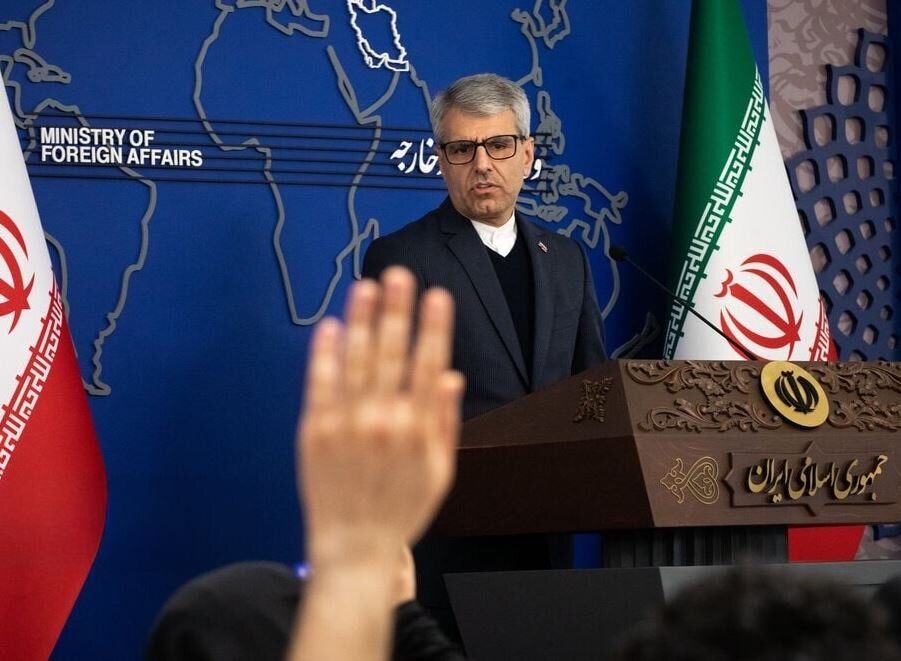Iran never left the negotiating table: foreign ministry spokesperson on talks with West

TEHRAN – The spokesperson for Iranian Foreign Ministry has affirmed the country’s commitment to diplomacy and dialogue, addressing Iran’s readiness for nuclear talks.
Speaking on the weekly press conference on Monday, Esmail Baqaei stated: "Iran has never abandoned the negotiating table. For over two decades, we have consistently participated in dialogue to address concerns. When questioning Iran’s willingness to continue negotiations, it’s crucial to examine the historical context and determine who is truly at fault. Moving forward, our decisions will be based on the actions and behavior of other parties. Iran has never been the party to halt negotiations."
Iran, E3 prepare for mid-January nuclear talks
Baqaei confirmed that the next round of nuclear talks between Iran and Europe will take place in mid-January: "The discussions will continue based on the agreed framework from the previous session in December, with the nuclear issue being one of the primary topics."
Baqaei stated that both sides had agreed to continue the negotiations based on the previous format and framework. He stressed Iran's unwavering commitment to dialogue over the past two decades, reiterating that the country has never abandoned the negotiating table.
The spokesperson emphasized that Iran’s future decisions will depend on the behavior and actions of the other parties involved in the talks.
Tensions between Iran and European nations have intensified in recent years, with Europe accusing Iran of supplying ballistic missiles to Russia for use in the Ukraine conflict—claims Tehran has categorically denied.
In November, the European troika spearheaded a resolution by the International Atomic Energy Agency (IAEA) Board of Governors. The resolution criticized Iran for its alleged lack of cooperation with the agency and called for a comprehensive report on its nuclear activities by spring 2025.
In response to the resolution, Iran announced the activation of new and advanced centrifuges, signaling a firm stance in the ongoing dispute.
Condemnation of U.S. interference
Baqaei also addressed the Leader’s recent remarks on U.S. involvement in unrest in Iran: "These statements from U.S. officials are nothing new. When a senior official from the Democratic administration openly intervenes in a country’s internal affairs, it adds another dark chapter to the extensive record of U.S. interference in Iran, which we strongly condemn."
Baseless allegations against Iran denounced
Responding to claims that Iran uses children to build proxy networks against Israel, Baqaei remarked: "These accusations have reached a new low in quality—absurd and entirely baseless. This claim is laughable and unfounded. Iran neither has proxies nor requires them."
Developments in Syria and U.S. policies
On the U.S.’s decision to waive a bounty for Abu Mohammad al-Jolani, Baqaei commented: "The Syrian people are fully capable of deciding their own future. These remarks demonstrate America’s imperialistic tendencies and ongoing interference in the internal affairs of other nations. Such actions only result in instability and division. The so-called terrorist sponsors’ lists are just tools in the U.S. foreign policy arsenal used to pressure other countries."
Progress in Iran-Egypt relations
Regarding recent developments in Tehran-Cairo relations, Baqaei said: "President Masoud Pezeshkian’s visit to Egypt was for the D-8 multilateral summit, an organization that has been active for nearly three decades. Participation in such platforms is important for fostering both multilateral and bilateral ties. Egypt is a key regional player and a significant force in the Islamic and Arab worlds. Strengthening relations with neighboring countries, including Egypt, remains a priority for Iran."
Iran-Russia agreement nearing finalization
On the Iran-Russia agreement, Baqaei announced: "The agreement is scheduled to be signed in late January, following the completion of discussions to finalize the timeline."
Addressing Palestinian rights and Israeli aggression
On recent UN resolutions, Baqaei highlighted: "This week, three resolutions were adopted concerning the Israeli regime, occupied Palestine, and Lebanon. One focuses on the Israeli regime’s responsibility for environmental damages caused by attacks on Lebanon’s oil reserves since 2007. Another emphasizes Palestinian ownership of natural resources, underscoring the ongoing exploitation in occupied territories. The third resolution requests an advisory opinion from the International Court of Justice on halting Israel’s settlement activities."
Baqaei dismissed reports of normalization between Saudi Arabia and Israel: "Normalization only emboldens the Israeli regime. It cannot erase the crimes committed against Palestinians. Regional countries have a moral and legal obligation to confront these injustices."
The Gaza Health Ministry said on Sunday that at least 45,259 people have been killed and 107,627 injured during more than 14 months of the Israeli regime’s genocidal war.
